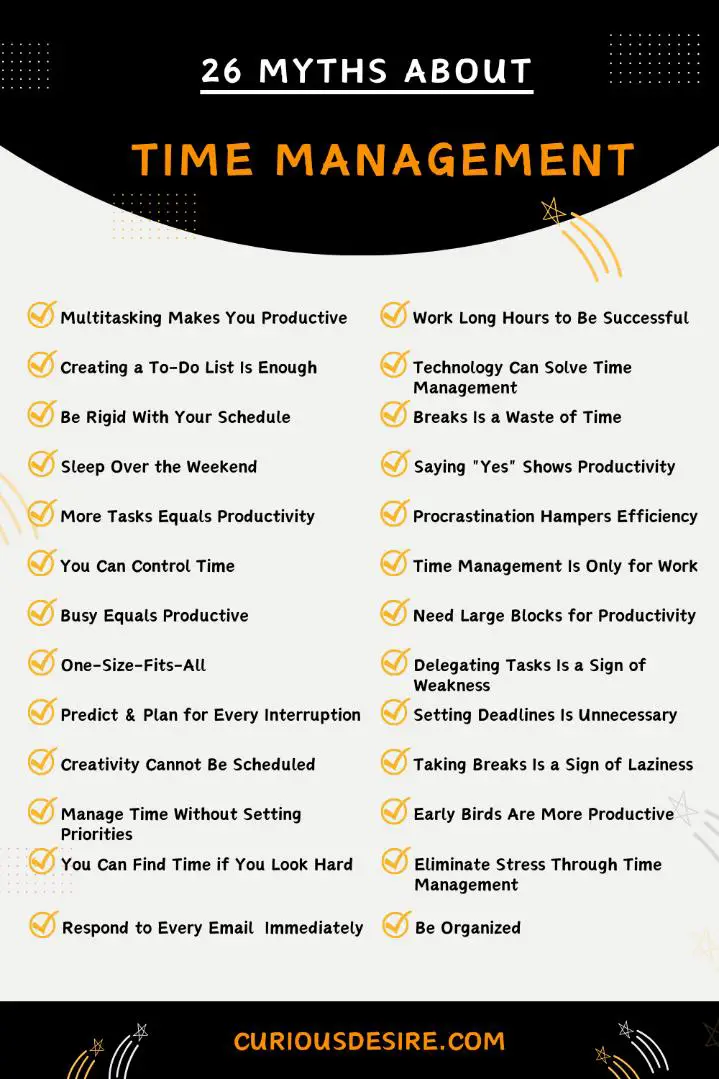In our busy lives, figuring out how to manage our time effectively is important. But sometimes, there are beliefs about time management that aren’t true.
These beliefs might make things more confusing instead of helping us.
In this discussion, we’re going to look at some of the most common myths about time management. We’ll break down each one to find out what’s going on.
Here are the 5 Most Common Myths About Time Management
- Multitasking makes you more productive.
- You need to work long hours to be successful.
- Creating a to-do list is enough to manage your time effectively.
- Technology alone can solve your time management problems.
- You have to be strict and rigid with your schedule.
[toc]

Myth 1: Multitasking Makes You More Productive
Many people believe that doing multiple tasks at the same time, known as multitasking, makes us more productive. They think our brains can easily switch between tasks without affecting how well we perform, allowing us to complete more tasks quickly.
Debunking the Myth:
Scientific research consistently reveals that multitasking is, in fact, counterproductive. The brain struggles to manage the cognitive load associated with shifting attention between tasks, resulting in increased errors and a decline in overall performance.
Focusing on a single task at a time enables individuals to achieve a state of flow, promoting better concentration, comprehension, and, ultimately, higher productivity.
Prioritizing tasks and completing them sequentially proves more effective than attempting to manage an array of activities simultaneously.
Myth 2: You Need to Work Long Hours to Be Successful
There is this belief that working more hours leads to more success. This idea suggests that spending a lot of time working is necessary to achieve your goals and move up in your career.
Debunking the Myth:
Contrary to this assumption, the quality of your work matters more than the number of hours you work. Working too much can make you feel exhausted, reduce your creativity, and affect your overall well-being.
A better way to succeed is by focusing on important tasks, setting limits, and making sure you have a good balance between work and personal life.
Success comes from doing your work well, not just spending a lot of time on it.
Myth 3:Creating a To-Do List Is Enough to Manage Your Time Effectively
People have this notion that just making a to-do list is enough to manage time effectively. The idea is that having a complete list helps with organization and increases productivity.
Debunking the Myth:
While to-do lists help stay organized, they’re just one part of managing time effectively. Simply listing tasks without careful prioritization, setting aside enough time, and considering task complexity might not lead to efficiency.
Successful time management involves a more thorough approach. This includes prioritizing tasks, setting realistic deadlines, and regularly reviewing and adjusting the plan.
A well-organized to-do list becomes even more beneficial when it’s part of a broader time management strategy.
Myth 4: Technology Alone Can Solve Your Time Management Problems
The idea behind this myth is that using productivity apps and digital tools alone can solve all time management issues.
The assumption is that technology, with its automation and streamlining features, can replace the need for other time management strategies.
Debunking the Myth:
While technology is a valuable ally in enhancing productivity, depending exclusively on digital tools is insufficient. Effective time management necessitates a combination of skills, strategies, and tools.
Overreliance on technology may result in digital distractions and create a false sense of productivity without tangible results.
It’s important to complement technology with personalized time management techniques, such as setting priorities, goal-setting, and periodic reflection on progress.
Myth 5: You Have to Be Strict and Rigid With Your Schedule
The view that adhering strictly to a fixed schedule is essential for effective time management assumes that any deviation from the planned schedule reflects a lack of discipline.
Debunking the Myth:
While having a schedule is crucial, being overly rigid can prove counterproductive. Life is dynamic, and unexpected events are inevitable.
A more flexible approach allows for adaptation and reduces stress associated with unforeseen changes.
Striking a balance between structure and flexibility enables individuals to respond to challenges without compromising overall productivity.
Myth 6: Taking Breaks Is a Waste of Time
This myth originates from the idea that taking breaks is counterproductive, as the time could be better utilized for work.
The assumption is that consistently working without breaks enhances productivity.
Debunking the Myth:
Contrary to this belief, research consistently supports the idea that regular breaks are essential for maintaining focus and overall productivity. Breaks prevent burnout, refresh the mind, and contribute to sustained concentration.
Strategic breaks, such as short walks or moments of relaxation, can even enhance creativity and problem-solving skills. Ultimately, incorporating breaks into your routine is an integral part of effective time management.
Myth 7: You Can Catch Up on Lost Sleep Over the Weekend
Many individuals believe that if they sacrifice sleep during the week, they can compensate by getting extra sleep on weekends. The assumption is that the body can easily recover from sleep deficits.
Debunking the Myth:
Sleep is really important for managing your time well. Even though some think you can make up for lost sleep on the weekend, not getting enough sleep regularly has a lasting impact on you.
Consistent, quality sleep is integral to enhanced cognitive function, mood, and overall health. Recognizing the importance of regular and sufficient sleep is essential for maintaining productivity throughout the week.
Myth 8: Saying “Yes” to Everything Is a Sign of Productivity
Some humans equate productivity with the willingness to accept every task or commitment that comes their way. The assumption is that a fully packed schedule signifies dedication and efficiency.
Debunking the Myth:
Saying “yes” to everything can lead to overcommitment, heightened stress, and a potential decline in the quality of work.
Effective time management involves setting priorities, learning to say “no” when necessary, and focusing on tasks that align with long-term goals.
Selective decision-making ensures that time is allocated to activities that genuinely contribute to success, rather than spreading oneself too thin.
Myth 9:The More Tasks You Have, the More Productive You Are
There is this misconception that a high volume of tasks equates to productivity, assuming that a busy schedule is a sign of success and accomplishment.
Debunking the Myth:
Quantity does not always translate to quality in the realm of time management. Overloading yourself with tasks can lead to stress, reduced focus, and decreased overall efficiency.
Effective time management involves prioritizing tasks based on importance and deadlines. This ensures that energy is directed towards meaningful and impactful activities rather than a sheer volume of tasks, resulting in a more productive and fulfilling approach.
Myth 10: Procrastination Is Always a Sign of Poor Time Management
Procrastination is often criticized, and seen as a sign of laziness or poor time management. People generally assume that those who regularly postpone tasks lack discipline and effective organizational skills.
Debunking the Myth:
Procrastination is a complex behavior influenced by various factors. While chronic procrastination can impede progress, occasional delays are a natural part of the creative process.
Understanding the root causes, such as fear of failure or a lack of clarity, allows for targeted solutions.
Procrastination becomes problematic when it consistently hinders productivity, but embracing occasional delays as opportunities for reflection can lead to improved task planning and more effective time management.
Myth 11: You Can Control Time
There is this shared belief among people that they can control time, believing they can make it do what they want and finish tasks at their speed.
Debunking the Myth:
Time is a constant, and everyone is bound by the same 24 hours in a day. Effective time management involves recognizing the limitations of time and making conscious choices about how to allocate it.
Instead of trying to control time, individuals can learn to manage their priorities, set realistic goals, and make intentional decisions about how to use their time effectively. The key lies in optimizing the use of time rather than attempting to manipulate it.
Myth 12:Time Management Is Only for Work, Not Personal Life
Some individuals compartmentalize time management, thinking it’s only for work or professional settings. They assume that organizing time isn’t necessary for their personal life.
Debunking the Myth:
Time management is equally crucial for personal life. Balancing work, family, and personal interests necessitates thoughtful planning and prioritization.
Applying time management principles enhances overall well-being, reduces stress, and ensures that time is dedicated to both professional and personal fulfillment.
A holistic approach to time management recognizes that personal and professional aspects of life are interconnected, requiring a harmonious balance.
Myth 13: Busy Equals Productive
People have this notion that always being busy means you’re being productive. Some connect a busy schedule with being successful and achieving things.
Debunking the Myth:
Busyness does not necessarily correlate with productivity. It is crucial to distinguish between meaningful, goal-oriented activities and mere busyness.
Productivity involves efficiently completing tasks that contribute to overarching objectives, not just filling time with numerous activities.
A strategic and intentional approach to task selection and execution is essential for true productivity, emphasizing quality over quantity.
Myth 14: You Need a Large Block of Time to Be Productive
Debunking the Myth:
Working in short, focused bursts, a technique called time blocking, can be very productive. Breaking tasks into smaller, manageable parts helps you stay focused and avoid burnout.
The quality of the time you spend on a task is often more important than the quantity.
Planning strategically and being able to concentrate in shorter time frames can make you more efficient and improve your overall time management.
Myth 15: Time Management Is One-Size-Fits-All
The mistaken belief that there’s one time management approach that works for everyone assumes that what’s effective for one person will be effective for everyone.
Debunking the Myth:
Individuals have different work styles, preferences, and priorities. Effective time management is a personalized process that may involve experimenting with various techniques to discover what aligns best with individual needs and goals.
Recognizing the uniqueness of personal workflows and adjusting time management strategies accordingly allows for a more effective approach to managing time.
Myth 16: Delegating Tasks Is a Sign of Weakness
Some think that asking others for help means you can’t do things yourself, and they believe it makes you look less good at your job.
Debunking the Myth:
Delegating tasks or asking for help is a strength, not a weakness. It allows individuals to focus on their core competencies and promotes collaboration within a team.
Effective leaders recognize the value of delegation in maximizing overall productivity.
When tasks are given to people who are good at them, it makes the whole team and organization more successful.
Myth 17: You Should Be Able to Predict and Plan for Every Interruption
The view that effective time management involves foreseeing and planning for all potential interruptions assumes a level of control over external factors that may not be realistic.
Debunking the Myth:
Unexpected interruptions are bound to happen, and trying to plan for every possible disruption is just not practical. Good time management means having some flexibility in your schedule to handle the unexpected.
Dealing with interruptions in a flexible way makes sure they don’t mess up your overall productivity.
Having a mindset that accepts and adjusts to the changing nature of work helps people handle interruptions without messing up their overall time management plans.
Myth 18: Setting Deadlines Is Unnecessary
Some individuals believe that working without specific deadlines allows for a more relaxed and creative workflow, assuming that arbitrary time constraints hinder the quality of the work.
Debunking the Myth:
Myth 19: Creativity Cannot Be Scheduled or Managed
The idea that creativity only happens spontaneously suggests it can’t be intentionally part of a planned schedule.
This belief often leads people to think they have to wait for inspiration, which makes it hard to actively work on being creative.
Debunking the Myth:
While creativity does have spontaneous aspects, it can also be nurtured and directed through intentional practices.
Setting aside specific time for creative activities, taking breaks to let the mind wander, and exposing oneself to various experiences can foster a more creative mindset.
By integrating these intentional efforts into a structured time management plan, individuals can boost both their creativity and productivity at the same time.
Myth 20: Taking Breaks Is a Sign of Laziness
The mistaken view that taking breaks is a sign of laziness believes that working without stopping is the best way to show dedication and hard work.
This myth sometimes stops people from including planned breaks in their work routines.
Debunking the Myth:
Taking breaks is not just necessary but also good for keeping focus and avoiding burnout. Short breaks, planned strategically, refresh the mind and boost overall well-being.
Studies show that quick breaks can increase productivity and creativity. Far from being lazy, taking breaks is a crucial part of managing time well, and it helps with long-term productivity.
Myth 21: You Can Manage Time Without Setting Priorities
The perceptive that time management can be achieved without establishing clear priorities assumes that all tasks hold equal importance.
This myth neglects the crucial role that prioritization plays in optimizing time usage.
Debunking the Myth:
Managing time well means knowing the difference between urgent tasks and those that are important.
Setting priorities ensures that time is spent on activities that match bigger goals and objectives.
Prioritizing is crucial for a well-organized and purposeful way of managing time. Without clear priorities, time can be spent on less important tasks, which can hurt overall productivity.
Myth 22: The Early Bird Catches the Worm—Night Owls Are Less Productive
This myth implies that being productive is connected to waking up early and assumes that people who work better at night are less efficient.
Debunking the Myth:
Productivity is not confined to a specific time of day. Different people have different biological rhythms, and some may be more productive during non-traditional working hours.
The key lies in aligning work schedules with personal circadian rhythms to optimize energy and focus.
Recognizing and respecting individual preferences regarding the timing of work can lead to enhanced productivity and job satisfaction.
Myth 23: You Can “Find” Time if You Look Hard Enough
This belief assumes that time is something hidden, waiting to be found through careful searching or giving up other activities. It suggests the idea that time can be controlled or stretched.
Debunking the Myth:
Time is limited, and managing it well means making deliberate choices about how to use it. Instead of trying to “find” time, the emphasis should be on prioritizing tasks, cutting out non-essential activities, and focusing on what truly matters.
Understanding that time is finite helps people make purposeful decisions, leading to more intentional and efficient time management.
Myth 24: You Can Completely Eliminate Stress Through Effective Time Management
Debunking the Myth:
Even though being good at managing time can help a lot, it can’t make stress disappear completely. Things like outside problems, surprises, and personal issues are just part of life.
To handle stress better, it’s important to have ways to cope, be resilient, and balance how you manage your time.
Knowing that stress is a big issue with many parts lets people come up with a plan that looks at more than just time management.
Myth 25: You Have to Respond to Every Email or Message Immediately
The perceptive that immediate responses to emails and messages reflect efficiency and professionalism assumes that delayed responses indicate poor time management.
Debunking the Myth:
Constantly reacting to messages can lead to frequent interruptions and reduced focus on important tasks.
Effective time management involves setting specific times to check and respond to emails, allowing for focused work on other priorities without being constantly pulled away.
Prioritizing communication and establishing boundaries around response times contribute to a more intentional and productive use of time.
Myth 26: The More Organized You Are, the Better Your Time Management
People largely think that being good at organizing things means you’re also good at managing your time well.
They assume that having everything perfectly organized at work will make you super productive.
Debunking the Myth:
Being organized is helpful, but it’s not the only thing that makes time management work well.
The crucial part is making sure that being organized matches up with what’s most important and that time is used on tasks that help achieve goals.
Focusing too much on organization alone might mean spending a lot of time planning but not getting things done.
Managing time well means looking at the big picture combining organization with smart decisions and taking action.
Time Management Myths FAQs
1. What is the common problem with time management?
The common problem with time management is procrastination. Many individuals struggle with delaying tasks, especially those perceived as challenging or unpleasant.
Procrastination can hinder productivity and lead to a cycle of increased stress as deadlines approach.
2. What is true about time management?
Time management is fundamentally about prioritization and efficiency. Effectively managing time involves setting clear goals, breaking them down into smaller tasks, and allocating time wisely.
It’s not just about being busy but about being productive and focused on tasks that contribute to long-term objectives.
3. What are the negative effects of time management?
Poor time management can result in various negative effects, such as increased stress, missed deadlines, and a decrease in overall productivity. Additionally, it can lead to burnout, affecting both mental and physical well-being.
4. What can go wrong with time management?
Several factors can disrupt effective time management. One common issue is the failure to accurately estimate the time required for tasks. Interruptions, multitasking, and inadequate planning can also contribute to time management breakdowns.
5. What are the 10 common time management mistakes?
Some common time management mistakes include:
- Procrastination: Delaying tasks unnecessarily.
- Lack of prioritization: Failing to identify and focus on high-priority tasks.
- Ineffective planning: Poorly organized or unrealistic schedules.
- Failure to delegate: Trying to do everything alone.
- Overcommitting: Taking on too many tasks at once.
- Constant multitasking: Dividing attention among multiple activities.
- Ignoring breaks: Neglecting the importance of rest and recharge.
- Unclear goals: Working without clear objectives in mind.
- Inability to say no: Accepting too many responsibilities.
- Not adapting to changes: Inflexibility in adjusting plans when necessary.
6. What are the 3 major reasons that we struggle with time management?
Firstly, a lack of self-discipline and motivation can hinder effective time management. Without the drive to stay focused and meet deadlines, individuals may struggle to manage their time efficiently.
Secondly, inadequate prioritization and goal-setting can lead to confusion about where to direct one’s efforts.
Lastly, external factors such as interruptions and unexpected events can disrupt planned schedules, making it challenging to adhere to time management strategies.



